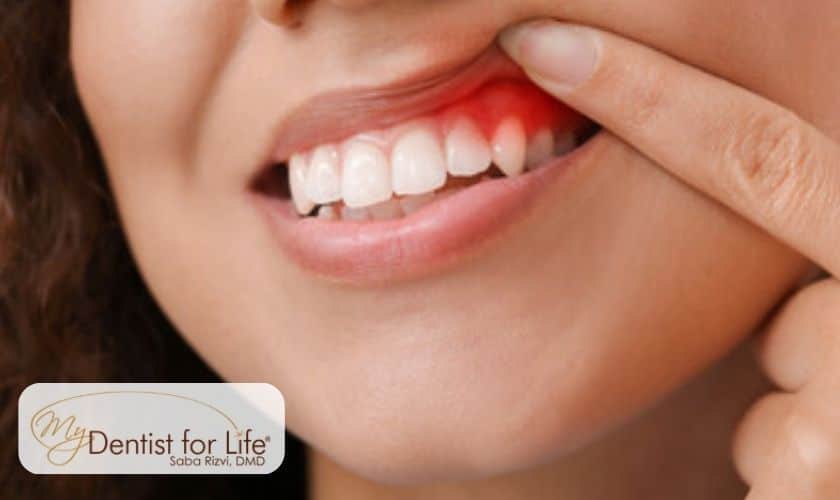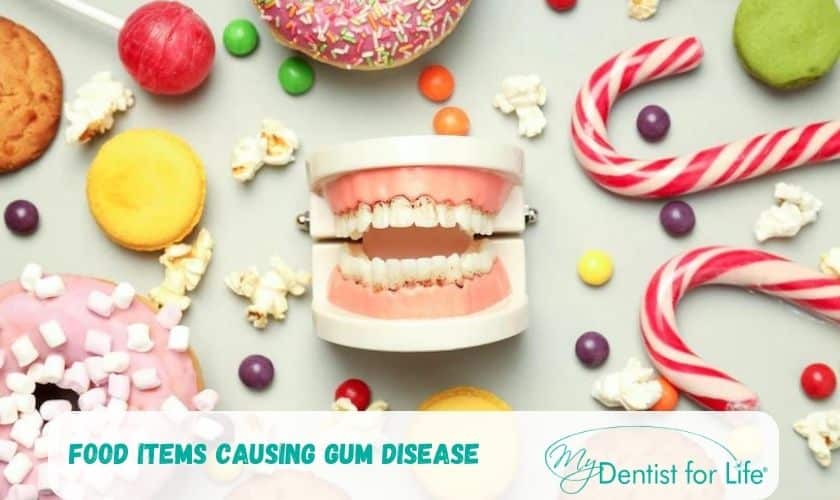ONLINE SCHEDULING AND VIRTUAL CONSULTS AVAILABLE

Periodontal Disease – Stages & Tips To Avoid It

In the United States, periodontal disease affects over half of all individuals. It can result in tooth loss, the need for dentures, and a plethora of other health issues. Gum problems should be treated appropriately regardless of how common the condition is thought to be because of their possible consequences. It is not restricted by age or gender and can affect anyone of any gender or age.
What Is Gum Disease?
Periodontal or gum disease is a type of infection that lasts long. It affects the gums as well as the jawbone, resulting in tooth loss as well as other systemic issues. When plaque builds up and hardens, periodontal disease develops, usually due to poor brushing and flossing habits. It contains four phases, only one of which can be reversed.
Periodontal disease is generally caused by bacteria. Suppose plaque and tartar are not eliminated regularly, the chances of suffering from gum problems increase. Smoking is the most significant risk factor, making periodontal disease treatment less effective. Diabetes, medicines that block saliva flow, inheritance, hormonal changes, and specific disorders such as AIDS are all factors that raise the risk of periodontal disease.
Know The Stages Of Gum Disease
Periodontal disease is divided into four stages: gingivitis, slight periodontal disease, moderate periodontal disease, and severe periodontal disease.
- Gingivitis – Gingivitis is the only stage of periodontal disease that can be reversed because it hasn’t yet affected the bones. This disorder is caused by plaque buildup around the teeth. There are only a few symptoms of this stage, and most of them are painless. Periodontal disease is common and considered dangerous because of this particular factor. Gum disease does not normally manifest itself until the fourth and final stage. Early warning signs include bad breath, swelling and redness of the gums, and bleeding when brushing or flossing. With appropriate oral care and regular checkups, gingivitis can be treated and reversed.
- Slight Periodontal Disease – Mild gum disease is the second stage of periodontal disease. It’s not reversible, but it can be managed. When a patient reaches stage two, the infection has spread to the bone, causing it to deteriorate. As the bacterium develops and becomes more aggressive, bone loss increases. Simple dental hygiene will no longer suffice. Gum swelling or redness, bad breath, bleeding when flossing or brushing, and probing depths of four to five millimeters are common signs.
- Moderate Periodontal Disease – Periodontal disease in its third stage cannot be reversed like moderate periodontal disease. Stage three has the same characteristics as stage two, but probing depths are six to seven millimeters, allowing more bacteria to harm your bones and your bloodstream and immune system. Periodontal disease in stages two and three are treated by scaling and root planing. Scaling and root planing are deep cleaning procedures that remove bacteria deposits from your gums. If left untreated, these stages can result in bone and tooth loss, gum sensitivity, increased bleeding, and tooth shifting.
- Advanced Periodontal Disease – When periodontal disease reaches its end stage, the infection worsens, and the bacteria revert to disease-causing bacteria. You have a 50–90% probability of losing bone mass presently. Red, inflamed, pus-filled gums, cold sensitivity, increased tooth loosening, painful chewing, and severe halitosis are all symptoms of advanced periodontal disease, including bone loss. Periodontal surgery or periodontal laser therapy is required to clean the deep bacteria-filled pockets that have formed in the mouth. Stage four periodontal disease results in tooth spacing or gaps, gum recession, the necessity for dentures, and other serious health problems if left untreated.
Tips To Prevent Periodontal Problems
Gum disease or periodontal problems can be prevented with the help of certain measures. They are:
- Maintain a proper oral hygiene routine – A serious case of periodontal disease can appear out of nowhere. Gum disease worsens with time; therefore, maintaining good oral hygiene can help prevent it from progressing to an irreparable level.
To begin with, plaque (a sticky layer of bacteria) accumulates with time if you don’t brush and floss daily. The plaque will then combine with other minerals on your teeth to form tartar, which requires teeth cleaning to eliminate. If plaque and tartar aren’t eliminated, your gums will become inflamed and irritated, leading to gum disease. Brushing and flossing your teeth twice a day, as well as having your teeth cleaned at the dental office every six months, will help you have healthy gums.
- Intake of more Vitamin C is important – One of the primary causes of gum disease is vitamin C deficiency. Increase your gum disease resistance by eating more oranges, strawberries, and kiwis or taking vitamin C pills. Vitamin C has anti-inflammatory effects that can help halt gum bleeding and swelling, which are frequent indications of gum disease.
- Maintain a balanced diet plan – A well-balanced diet is beneficial for your teeth and can also help you enhance your overall health. Stay away from sugary meals and beverages, which can cause tooth decay. Plaque bacteria feed on carbohydrates and sugar, generating acids that can harm your teeth and gums. Check the nutritional information on the package before adding it to your shopping basket. Many meals and beverages labeled as “healthy” can have a lot of sugar in them.
- Staying hydrated is a must – Did you know that saliva is one of our body’s most effective natural anti-plaque defenses? Your body produces more saliva after a meal to wipe away food particles and plaque. Drink enough water throughout the day to keep your smile healthy. Also, keep in mind that some beverages, such as coffee or alcohol dehydrate rather than hydrate you.
- Go for regular teeth cleaning sessions – Our dental hygienist will be able to remove plaque and tartar from your teeth during teeth cleaning sessions. We will be able to check for any signs of gum disease, later on, so you can keep your smile healthy.
Our dentist can help you control your periodontal disease even if you already have it. Scaling and root planning are two procedures that can help you avoid receding gums and other oral health problems. Schedule an appointment at My Dentist For Life if you are looking for the best teeth cleaning service in Plantation, FL, and nearby.




